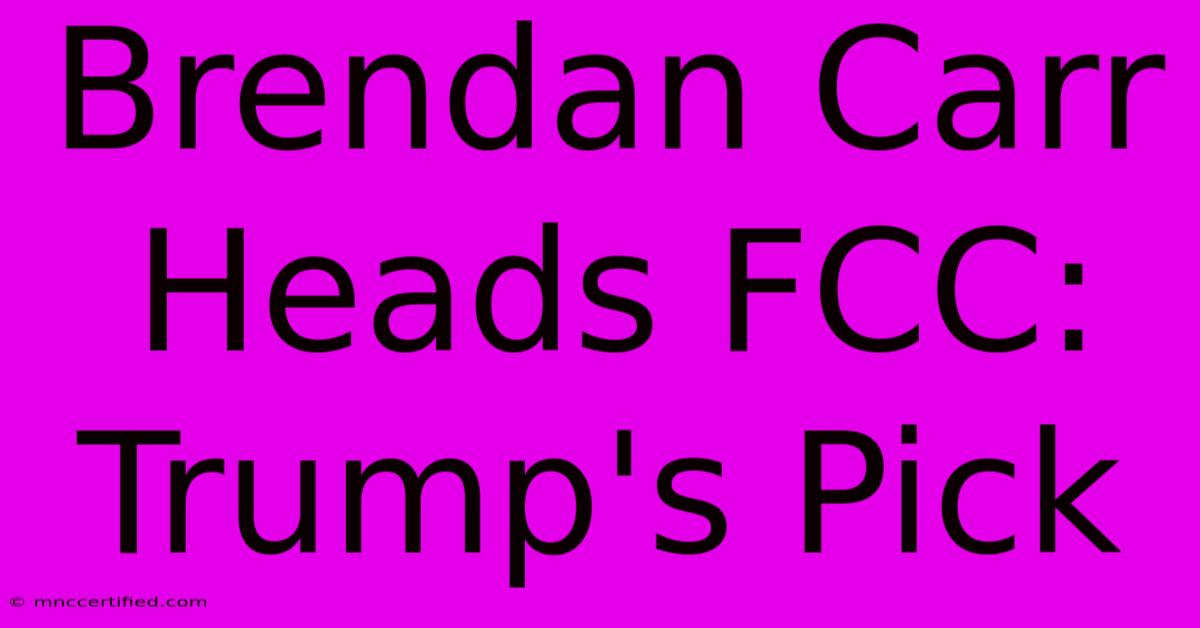Brendan Carr Heads FCC: Trump's Pick

Table of Contents
Brendan Carr Heads FCC: Trump's Pick, Policies, and Impact
Brendan Carr's tenure as an FCC commissioner, particularly his appointment during the Trump administration, has sparked considerable debate and analysis. This article delves into his background, key policy decisions, and the lasting impact of his leadership.
Who is Brendan Carr?
Brendan Carr, appointed by President Trump in 2017, served as a Republican commissioner on the Federal Communications Commission (FCC). Before his FCC role, he held positions in the legal and political arenas, working as a senior counsel to Senator Ted Cruz and as an attorney in the private sector. This background shaped his regulatory approach, often characterized by a more deregulatory stance and a focus on free market principles. His nomination and confirmation highlight the significant role of political appointments in shaping the direction of regulatory bodies like the FCC.
Key Policy Positions and Actions
Carr's time at the FCC was marked by several significant policy decisions. These include:
-
Net Neutrality Rollback: A pivotal moment during his tenure was the repeal of net neutrality rules. He actively advocated for this decision, arguing that the regulations stifled innovation and investment. This action, however, drew substantial criticism from consumer advocacy groups and net neutrality proponents. The debate surrounding this decision continues to shape the discussion around internet regulation.
-
5G Deployment and Spectrum Allocation: Carr played a key role in facilitating the deployment of 5G technology in the United States. He championed policies aimed at streamlining the process of spectrum allocation and licensing, promoting competition among telecommunications providers.
-
Media Ownership Regulations: Carr's views on media ownership regulations reflect his generally deregulatory approach. He often supported policies that eased restrictions on media consolidation, a position that sparked debate about media diversity and market concentration.
-
Combating Foreign Influence: Under Carr's leadership, the FCC took action to address concerns about foreign influence on telecommunications networks. This involved efforts to protect critical infrastructure and prevent the use of technology to undermine national security. This aspect of his work highlights the complex intersection of technology policy and national security.
Impact and Criticism
Carr's policies have had a far-reaching impact on the American telecommunications landscape. While proponents highlight his efforts to promote competition and innovation, critics raise concerns about:
-
Reduced consumer protection: The rollback of net neutrality, for example, is frequently cited as a move that potentially harms consumers by enabling internet service providers to prioritize certain traffic over others.
-
Increased media consolidation: Easing media ownership rules raises questions about the potential for reduced media diversity and the influence of large corporations on information dissemination.
Legacy and Future of FCC Policy
Brendan Carr's legacy as an FCC commissioner is multifaceted and continues to be debated. His emphasis on deregulation and market-based approaches, particularly evident in the net neutrality repeal, is likely to be a significant talking point for years to come. His actions had a direct influence on the speed of 5G deployment and the strategies used to combat foreign influence. Understanding his contributions provides vital context for analyzing the current state and future direction of FCC policy. Analyzing his specific policy initiatives, considering the perspectives of both supporters and detractors, and examining the long-term implications of his actions will ultimately shape his historical evaluation.
Keywords: Brendan Carr, FCC, Federal Communications Commission, Trump administration, net neutrality, 5G, media ownership, deregulation, telecommunications, technology policy, political appointments, regulatory reform.

Thank you for visiting our website wich cover about Brendan Carr Heads FCC: Trump's Pick. We hope the information provided has been useful to you. Feel free to contact us if you have any questions or need further assistance. See you next time and dont miss to bookmark.
Featured Posts
-
Bo Nix Denvers Rookie Qb Rise
Nov 19, 2024
-
Sam Kerr Kristie Mewis Pregnancy Announcement
Nov 19, 2024
-
Spirit Airlines Bankruptcy Risk
Nov 19, 2024
-
Uefa Nations League Croatia Vs Portugal
Nov 19, 2024
-
So Cal Thanksgiving Plan For Record Travel
Nov 19, 2024